Archives
Flush the toilet and wash your hands.
The toilet flush button can potentially be a source of germs and bacteria, as it is frequently touched by multiple people and not always cleaned regularly. However, other surfaces such as the toilet seat and tap handles may also be sources of germs.
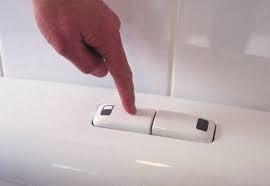
It is important to practice good hygiene and regularly clean all surfaces in the bathroom to minimize the spread of germs.
The flush button, like any other surface, can potentially spread viruses if it is contaminated with the virus and then comes into contact with someone’s mouth, nose or eyes.
The corona virus experience showed us germs can survive on surfaces for varying periods of time, depending on the type of surface, the humidity and the temperature. Therefore, it is important to frequently clean and disinfect high-touch surfaces, such as the toilet flush buttons, to help prevent the spread of germs.
Practicing good hand hygiene, by washing your hands thoroughly and frequently, can also help prevent the spread of viruses.
Wash your hands. World Toilet Day
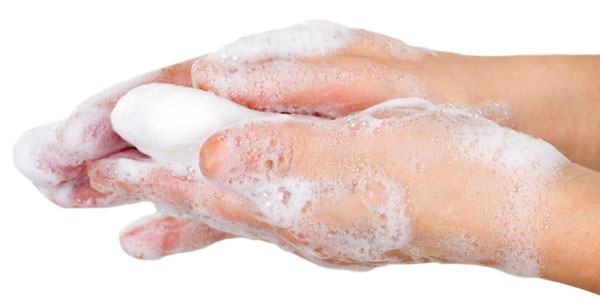
Hands are a major part of any plumbers tool kit.
Without them, it would be difficult to carryout other parts of our job. Cutting pipes with a saw, cleaning and glueing pipes together, disconnecting the water and gas at your meter, changing tap washers in your hand basin or even clearing a blocked drain with a sink plunger.
And washing hands is part of our job!
I could wash my hands at least 10 times a day, even if we are wearing gloves to protect them and especially after clearing a blocked drain.
In fact, being a NSW Master Plumber in Sydney we are reminded Hygieia is the goddess of health, cleanliness and hygiene.
Her name is the source of the word Hygiene.
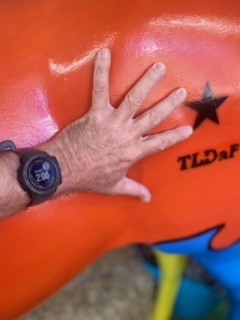
Bathroom cleaning tip #2
We plumbers wash our hands 10 or more times a day.
The Coronavirus pandemic is making us all think about the transmission of germs and how the virus is transmitted on the surfaces we come in contact with. Any time we work in your bathroom we more than likely touch the hot and cold taps in your bath, shower or hand basin and the cold water tap to your toilet.
The tap supplying water to the toilet isn’t touched regularly, so, it has a reduced chance of transmission through touch. But, it is near the toilet so airborne germs are a concern.
The simple task of using the toilet and then wiping ourselves is something we all learned as kids, but, in researching this article I’m surprised to learn the number of different methods people use.
No matter how you do it, the first thing we all do is flush the toilet.
Before we wash our hands!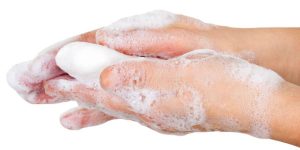
Alarm bells are ringing for you right now. As they should be!
But(t), let’s be practical.
Whether you have a plumber working in your bathroom or not, keep an atomiser spray bottle with a mix of water and disinfectant with an appropriate cleaning cloth in your bathroom. Spray the toilet flush button, the cistern lid, the toilet seat and lid and wipe them over thoroughly.
And if you’re keen to clean the entire bathroom, click here to see another of our easy cleaning tips.
Don’t do this in the bathroom!
During our Coronavirus work schedule, I’ve found some fun hints and tips about plumbing and health that are worth sharing.
How germs spread:
- on your toothbrush,
- your toilet seat,
- and the toilet flush button, are just a few examples.
The Lone Drainer and Pronto. Coronavirus Diaries Madrigal Communications
The Lone Drainer Coronavirus Diaries has been a chance to check in with small businesses to find out how they have been getting on during the Coronavirus lockdown of 2020.
In this clip, I speak with Tim Entwisle from Madrigal Communications.
Tim writes up tender documents for Aussie companies that are applying for large government contracts in the construction, energy and telecom sectors.
I’ve known Tim for about eight years. He’s a Rugby fanatic, an ocean swimmer, a wordsmith. Tim loves language, and he blogs about our language. He has written several blogs about Coronavirus.
Check them out on his website. https://madrigal.com.au/word-of-the-week-blog/
The Lone Drainer And Pronto Coronavirus Diaries The Fudge Shop #1
The Lone Drainer Coronavirus Diaries is a chance to catch up with some friends and businesses that we help to see how they are affected during the Coronavirus lock down of 2020.
In this short clip I chat with Adam Joseph, owner of The Fudge Shop in Darling Harbour Sydney NSW.
The Fudge Shop has been shut down and Adam shares how the Coronavirus has affected his family and his business.
The Lone Drainer And Pronto Coronavirus Diaries D’Ettorre Real Estate #3 SME Advice
In this episode of The Lone Drainer And Pronto Coronavirus Diaries, I speak with Dom D’Ettorre, principal of D’Ettorre Real Estate in Woollahra Sydney.
Subsidies are available for commercial tenants. SME’s – Small to medium entrepreneurs. Beautician, dentists, yoga studios and gymnasiums have lost 100% of their business income.
Find out how that affects the tenants and the property owners. “It’s NOT 1 size fits all.”
The Lone Drainer And Pronto Coronavirus Diaries D’Ettore Real Estate #2 Negative Gearing
In this edition of The Lone Drainer And Pronto Coronavirus Diaries, I speak with Dom D’Ettorre, principal of D’Ettorre Real Estate in Woollahra Sydney about how his negatively geared owners are being affected.
Investors have bought properties as AirBnB sites and now as travel is severely restricted the owners have to adjust quickly to manage the finance on their properties.
Some properties may be vacant for 6-12 weeks
Mum and dad investors who thought “I’m going to buy an investment property” and borrowed 90% and now lost their job… it’s going to hurt.
Listen and learn from Dom’s experience.
The Lone Drainer And Pronto Coronavirus Diaries D’Ettorre Real Estate #1 What’s going on
In this edition of The Lone Drainer And Pronto Coronavirus Diaries, I speak with Dom D’Ettorre, principal of D’Ettorre Real Estate in Woollahra Sydney.
2020 was shaping up as a landmark year for Sydney real estate, then the Coronavirus came to our shores.
Dom shares how his clients, property owners and their tenants are responding to the rapid-fire changes to the Sydney real estate world during the lockdown. He shares how vendors and prospective buyers are changing their habits, their expectations, their motivations and the pressures affecting them.
Toilet paper is no longer a hot ticket. Guess what is?
The stampede on toilet paper has slowed for now. But I overheard an 18 year old chemist assistant telling her mum about the latest hot items running out the door of her pharmacy during the lockdown over the last 4 weeks that is worth sharing.
She rattled off a list of items and her thoughts on why.
With respect to brand names…
Armaforce – General health.
Panadol – Just in case they get the virus.
Thermometers – 36.3 is normal body temperature.
Lemsip – To keep colds away.
Betadine – I don’t know why.
Voltaren – Over training by the work from home crew.
Thrush cream – They’re all wearing leggings and have thrush. Bad idea.
Pregnancy test kits – There will be a baby boom early 2021.
Nail polish – They can’t go anywhere.
The Lone Drainer And Pronto Coronavirus Diaries #1 Wylies Baths
The Lone Drainer Coronavirus Diaries is a chance to catch up with some of our friends and businesses that we help, and that help us, to see how they are affected during the Coronavirus lock down of 2020.
In this short 4.33 minute YouTube clip I speak with Courtney Tallon, the manager of Wylies baths in Coogee NSW.
Can Coronavirus be spread through wastewater pipes in a home or hospital?
Sydney April 15th 2020
“Staying connected” has become a part of our language lately.
Did you know we are all connected through the wastewater pipes in our homes?
Whether you live in a single level detached home or a multi-storey building, all our plumbing fittings drain into the same city sewer. That’s your shower, bath, basin, your WC, kitchen sink, washing machine, laundry tubs and floor drains.
A study showed the 2003 SARS virus spread through the plumbing system of a HongKong residential complex whose residents had 300 confirmed cases and 42 deaths- about 1/6th of the infections and fatalities on the entire island.
Our Australian Standards state “all plumbing fixtures must have a working trap or water seal”. That is, the S-bend at the outlet of the fixtures should have water sitting in them OR flowing through them.

Regularly we’re asked to investigate “a sewer smell” in a bathroom or laundry that is nothing more than a dry trap.
But, its allowing smells and bacteria to come from the wastewater and sewer pipes into your room.
Hypothetically, if an infected neighbour flushed their toilet and that wastewater entered a pipe you’re connected to, then bacteria could pass through a dry trap and enter your bathroom.
While person-to-person and surface-to-person is the most common means of spreading Coronavirus, I want you to be aware that any open or dry traps may allow contaminated droplets into your space.
So:
• Do not ignore unexplained foul smells in bathrooms, kitchens or washing areas.
• Ensure all your sink traps and S-bends have water in them.
• Run water into all tubs and showers for a few seconds in the morning and evening, paying particular attention to floor drains in bathrooms and laundries.
• If the wastewater pipework from a toilet, sink or other household appliance appears to be disconnected or open, seal it immediately.
• If you find any crack or leak in pipework, seal it with strong tape.
• Encourage your facilities managers to monitor the wastewater system performance of your building, looking out for things such as drainage overflows or sewer smells.
If you have any questions about this, I invite you to call me.
Tree roots don’t know about Coronavirus
Sydney April 14th 2020
Easter is over for another year.
Although our towns are slowing because of the Coronavirus, and we are quickly changing our daily home and work habits, here at The Lone Drainer and Pronto, we are still working away.
Working from home is putting our normal facilities under a little more pressure. That means the internet, the exercise areas and our bathrooms.
With all that extra baking and comfort meals, our sewers are under a more significant workload. Tree roots don’t know about Coronavirus, and still seek food and water in the sewer pipes they can grow into.
So, if you hear your drains gurgling don’t ignore them. They are asking for help.
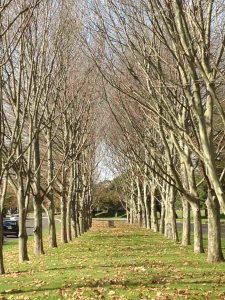
Dormant, but active underground
Be careful what you flush down the toilet!
Sydney March 31st 2020
As we work through COVID-19, our work, social distancing, hygiene and consumption habits are being challenged daily.
The run on toilet paper in our supermarkets has left me bewildered.
I had to see it for my own eyes. And did!
The take away for me is that those who couldn’t purchase their normal supply have resorted to buying and using baby wipes, paper towels and facial tissues. Please remember they’re not for flushing down the toilet because they don’t break down and can block your drains!
If you’re desperate for toilet paper we have a few boxes at our Coogee office.
